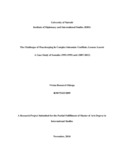| dc.description.abstract | As of 2014, it is over two decades since Somalia has been persistently ravaged by war following
the fall of President Siad Barre’s regime. The nature of the Somali civil crisis and the international
context within which it has been occurring has been continuously mutating. It transformed from a civil
war in the 1980’s, clanisim and warlordism in the 1990’s; to a globalized ideological conflict in the
new millennium. On the peacekeeping front, Somalia remains one of the most challenging endeavors
faced by the African Union and the United Nations. Following the Cold War, peacekeeping operations
have continuously evolved in response to dynamic and complex security environments. Contemporary
peacekeepers remain confronted by intra-state conflicts where the proclaimed peacekeeping principles
of consent, impartiality and the non-use of force may be unfavorable to the implementation of critically
required mandates. This Research Project focused on the challenges faced by peacekeepers and
particularly by the African Union in Somalia in terms of responding to complex intra-state conflicts.
The project also sought to establish the lessons learnt in Somalia in order to provide recommendations
for future peacekeeping operations. The main methodology deployed was the collection of materials
from secondary sources. To-date, the study findings indicate that traditional peacekeeping remains the
most developed response mechanism to conflict. In principle, peacekeeping is more likely to succeed
when there is an agreement to keep; when there is consent, impartiality and when there is non-use of
force reigns except in self-defense. Enforcement measures are extremely complex and should be
employed with caution under very exceptional circumstances. The common challenges contemporary
peacekeepers face include the lack of: clear mandates, adequate troop contribution, funding,
communicating the purpose of the mission to the local community, troop contributing countries
preparing their citizens psychologically for some of the high risks in peacekeeping operations and lack
of a unified command. Overall, peacekeeping operations in Africa suffer from lack of the political will.
Peacekeepers in Somalia are particularly confronted with faceless and irregular forces that can easily
blend in with the local communities and employs guerrilla as well as asymmetrical tactics. Much of
the focus on Somalia has been aimed at addressing the symptoms of the conflicts rather than focusing
on the causes. The Peacekeeping efforts in Somalia need to be accompanied by a political framework;
otherwise the mission will eventually be ineffective and unsustainable. It is not possible to solely
depend on a military solution to resolve the crisis in Somalia no matter how militarily powerful or
technically superior the intervener is; the mission can only bear fruit if accompanied by an inclusive
political process. The general conclusion reached is that, peace enforcement efforts in Somalia have
temporarily managed to restrain the violence. The presence of peacekeeping forces will not guarantee
lasting peace. The peacekeepers have created a window of opportunity for the government, diplomatic,
development and humanitarian actors to address the underlying causes of the conflict. | en_US |

